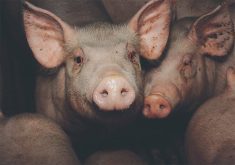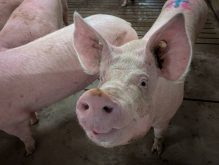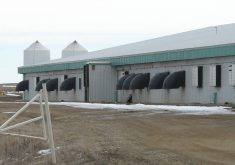The federal government is putting up an eight-figure funding wall to help prevent African swine fever from ever reaching Canada’s hog farms and to prepare against any breach.
Agriculture Minister Marie-Claude Bibeau said Aug. 26 the government will provide up to $45.3 million toward a three-pronged effort to boost disease prevention and preparedness: pork sector programming; Canadian Food Inspection Agency (CFIA) capacity; and border controls.
Of that amount, $23.4 million is to go toward the Canadian pork industry’s “prevention and mitigation efforts” over a two-year period. That work would include:
Read Also

Spoken questions are what make it an interview
Recently, I was exchanging emails with the media email account at a government agency, hoping to reach a source for…
- biosecurity assessments and improvements, including wild pig management;
- economic modelling, scenario analysis and marketplace assessment;
- swine fever-related research;
- preparedness for “welfare slaughter” and deadstock disposal, including slaughter plant retrofits; and
- evaluation of “high-capacity technologies for humane depopulation of surplus hogs.”
For that part of the funding envelope, program details “are being developed and the program will be launched as soon as possible,” the government said in a release.
Separately, up to $19.8 million of the larger funding package is earmarked for CFIA’s prevention and preparedness efforts over a three-year period. Those include:
- boosting surveillance and lab capacity, including rapid diagnostic testing;
- exercises and development of response plans for different scenarios;
- raising awareness, outreach and communications to prevent swine fever spread;
- development of “compartments” — that is, a subpopulation of animals free from disease in one or more establishment that share a “common high standard of biosecurity;” and
- facilities, knowledge and expertise to support international partners developing a swine fever vaccine and to help set up a framework for distribution. There is no known effective vaccine against ASF.
That portion will also support the CFIA’s work in setting up zoning arrangements with additional trading partners.
Such zoning pacts, which in an outbreak are meant to help protect the flow of exports from regions of Canada where a disease has yet to appear, are already in place with the U.S., European Union, Singapore and Vietnam.
The remaining $2.1 million is set to support Canada Border Services Agency (CBSA) border control activities, such as “measures that continue to prevent the entry of high-risk pork and pork products.”
Those include raising public awareness, improving “commercial targeting” and developing policy and procedure training for border services officers.















